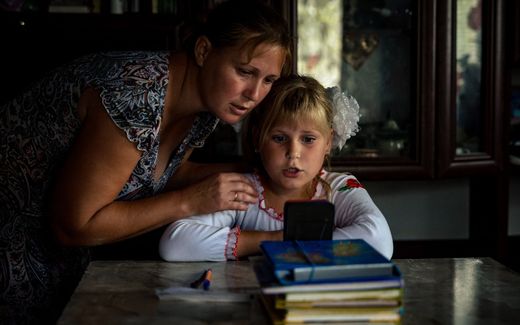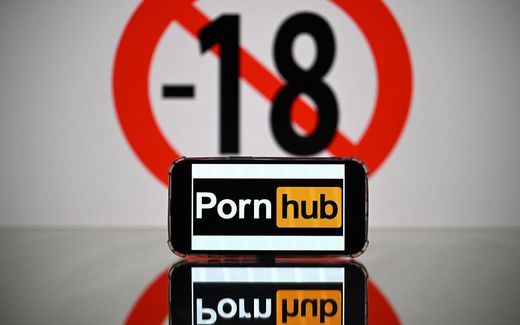Book review: Jonathan Haidt offers simple tips for responsible media use (but no one listens)
15-10-2024
Opinion
Pieter Beens, RD

A young girl uses her smartphone. Photo AFP, Yoshikazu
Opinion
Several high-profile and interesting books on media use were published this summer. What do they have to say, and what can they contribute to media education and media literacy?
Stay up to date with Christian news in Europe? Sign up for CNE's newsletter.
"Suppose your eldest daughter has turned ten and a millionaire with visionary ideas (...) turns out to have chosen her to participate in the first permanent human mission on Mars."
Social psychologist Jonathan Haidt is clear in the first paragraphs of "The Anxious Generation. How the Great Rewiring of Childhood Is Causing an Epidemic of Mental Illness": as far as he is concerned, modern media are like the planet Mars. Technology companies created their own 'planet' on which they unceremoniously invite inexperienced users. Parents and educators lose out, while their children –the new planet dwellers– are not resilient to anything they encounter in the unfamiliar world.
This cannot be without consequences, Haidt argues in his much-discussed book, which has now been one of the world's best-selling books for more than 20 weeks. Using studies, he shows the impact of social media use on young adults' social well-being and how too much screen time damages youth.
Short nights
The figures are staggering. American students make increasingly shorter nights, young people are less satisfied with themselves since the introduction of modern media, and the number of Swedish boys in the highest grades of primary school (around 14 years old) who watch porn "just about every day" has increased by almost 10 per cent.
Girls suffer more harm than boys, Haidt observes. He quotes US influencer Jessica Torres, who began to measure her personal worth and the value of her work by the number of likes she received on her posts. He also knows several girls who wanted to end their lives because they just could not live up to the ideal image on social media.
There is, concludes the social psychologist, normlessness. The virtual world lacks stable and widely shared norms and rules, and therefore young people experience life as meaningless more often than their peers roughly 25 years ago.
That it has come to this, according to Haidt, has to do not only with the content of social media but also with the technology behind social media. After all, websites and apps are aimed at holding users' attention for as long as possible and deliberately incorporate addictive techniques to achieve that goal.
Children
Can the tide still be turned? And can you protect young people from the many negative influences social media has on their minds?
As far as Haidt is concerned, it is possible. He lists a number of concrete ways schools and educators can get involved. Phone-free schools could help, as could outdoor activities, summer camps without smartphones and a clear daily structure. In this, educators have an important role to play. They need to re-learn to let go and let their children explore the world. Let children be children the old-fashioned way again, his motto seems to be.
For their part, governments could take children more into account when designing public spaces. If they raise the age of 'digital adulthood' to 16 and create more vocational education and apprenticeships, young people would see their lives as more meaningful.
As practical as Haidt's suggestions are, more than once, they come across as something everyone could have thought of. The tips for parents seem largely based on the idea that parents try to keep their children small and exert unhealthy control tendencies.
Take the tip: 'Try not to schedule more than two afternoons a week with "enriching activities" under adult supervision'. That suggests that parents often take educational and formative outings with their children. However, practice shows that parents actually leave their children to their own devices in the virtual world or have lost control over their screen use. Therefore, the emphasis on 'safetyism' –the urge of parents to protect their children from the evil outside world– will not be relatable to everyone.
Watered down
When it comes to tech companies, Haidt goes easy on them. They could develop better age verification capabilities or add features that allow parents to set a minimum age for certain sites. Yet these are only simple –and low-impact– recommendations for companies that base their revenue model on endless streams of new content and have built addictive techniques into their apps to do so.
Moreover, practice shows that concrete plans are quite often delayed, late or watered down under the influence of tech lobbyists. The advice towards these drivers of generation anxiety disorder is therefore too non-committal.
Haidt's suggestions, therefore, raise the question of what, specifically, is going to change. Because if technology companies are stubborn, governments are often reactive, and educators are powerless (or have fallen into the trap themselves), it will take more than awareness-raising to keep a new generation from porn addictions and suicide attempts. If the bestseller teaches anything, it is that many parents and young people are powerless. So, it is high time for concerted action.
Related Articles









